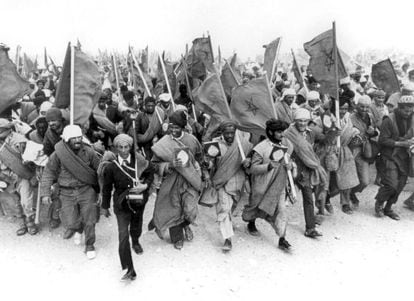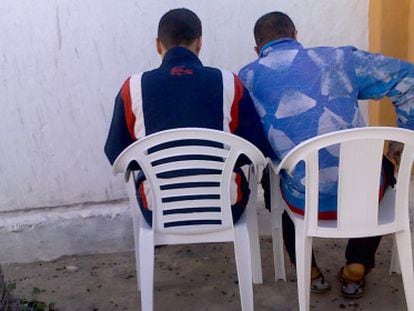Morocco fetes 40th anniversary of Green March into Western Sahara
King Mohammed will travel to Laâyoune to announce important measures for the region


The pastry shops have sold out of sweets, and all the major buildings in Morocco’s capital are decorated with red and green lights – the colors of the national flag.
Everyone is talking about the reported plans by King Mohammed VI to visit the Western Sahara on Friday to celebrate the 40th anniversary of the Green March, when 350,000 unarmed Moroccans were sent in 1975 by his father, the late King Hassan II, to pressure Spain’s military to withdraw from the territory.
The operation was a success for King Hassan, who ruled Morocco from 1961 until 1999
The operation was a success for King Hassan, who ruled Morocco from 1961 until 1999.
The entire plan, which was kept secret, was publicly announced on television by the king on November 6, 1975 just hours after the European Court of Justice in The Hague issued a landmark ruling about whether the Western Sahara, at the time of its Spanish colonization, was a territory without ownership.
Even though the ruling only referred to “legal bonds of submission between the sultan of Morocco and some of the tribes that live there,” while at the same time also recognizing the “self-determining rights” of the people living in the area, Hassan II took advantage of Francisco Franco’s deteriorating health and called the march.
The Spanish dictator died on November 20, 1975, and Spain withdrew on February 27, 1976.
Many people under the age of 40 grew up hearing stories about the Green March from their parents, while the government reminded the people on a yearly basis about the epic accomplishment.
But the 40th anniversary is a special one for the government.
Although there is no official confirmation that Mohammed will travel to Laâyoune – the most important city in Western Sahara, with a population of 300,000 – local media have reported it as a done-deal and said the king will announce important economic measures for the region.
No political party has questioned the fact that Morocco has sovereignty over the Western Sahara.
Sahrawi independence leaders of the Polisario Front, which is supported by neighboring Algeria and other nations, have for years been pushing for a referendum.
Ikea in Casablanca was blocked from opening after Swedish lawmakers announced a report on the conflict
Following Spain’s withdrawal, a 16-year war broke out between the Algerian-backed Sahrawis and Morocco for control of the mineral-wealthy region.
Even though a ceasefire was later declared, the conflict continues to create international tensions to this day.
In April, the Spanish High Court indicted 11 military leaders from Morocco for genocide offenses allegedly committed in the region after Spain withdrew. The court alleged from 1976 until 1992 there was “a systematic attack against the Sahrawi civil population on the part of the Moroccan military and police forces.”
One diplomatic incident took place recently when the Swedish furniture and home accessories company Ikea was set to inaugurate a store outside Casablanca. The local civilian government in September blocked the opening after Swedish lawmakers announced that they were preparing a report on the Western Sahara conflict.
All political parties support Moroccan sovereignty in Western Sahara
In an effort to convince Swedish parliamentarians that the region did belong to Morocco, King Mohammed’s government sent a delegation of Moroccan leftist politicians to Stockholm.
Among the members of the delegation was Nabila Munib, the general secretary of the Unified Socialist Party (PSU) and the only woman who heads a political grouping in Morocco.
Munib and the PSU have been very critical of King Mohammed, saying that his regime is only “a democracy on paper.” The party refused to field candidates in the 2011 parliamentary elections.
But when it comes to the Western Sahara conflict, the PSU has sided with all other Moroccan parties, including the ruling Islamist Justice and Development Party (PJD), which all support Moroccan sovereignty in the region.
English version by Martin Delfín.











































